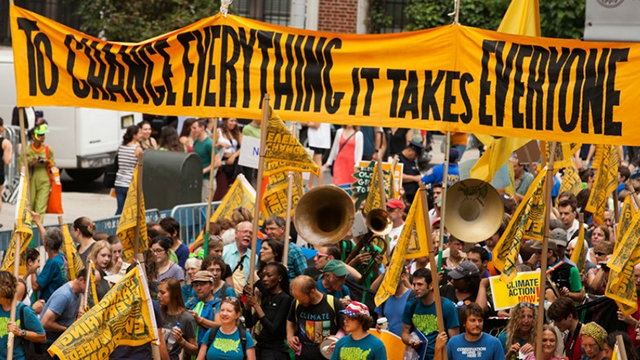This post first appeared at The Huffington Post.
In September 2014, something monumental happened. Around the world, people took to the streets. In New York City alone, 400,000 people of faith, communities of color and indigenous communities, labor unions, youth groups and other organizations marched to demand action on climate. But that public outpouring of support was only the beginning. In the months since, we’ve been quietly but concertedly building on the success of the People’s Climate March.
Now we’re taking the organizing muscle that brought half a million people around the globe to the streets and ramping up the ongoing efforts to involve local communities while doubling down on the effort to bring in even more of the groups who don’t traditionally work on environmental issues. The People’s Climate Movement is organizing to mobilize people from all walks of life for a National Day of Action on October 14.
By going to PeoplesClimate.org, you can sign up to lead an event in your community like a rally or march, or see how you can join an event already planned in your community. And because Congress will be in their home districts that week, it’s a perfect time to meet with your elected officials.
Because, to show politicians we’re serious, we need more than a march — we need a movement. We don’t need one group or one constituency; we need many groups, many people, and many voices. Movement building is never over, and what we’ve built to date is strong and growing. There’s room for everyone in the People’s Climate Movement.
Whether it’s people of faith heeding Pope Francis’s moral call to action, people of color marching to protect their communities or unions and working families fighting for green jobs, or business owners looking to protect their livelihoods, the National Day of Action will show everyone that climate change affects people from all walks of life — even as we recognize that the impacts of climate change will not be evenly felt. No longer is climate change a niche issue; people from every part of the planet need to act. As we say, when trying to change everything, we need everyone. Everywhere.
When we all raise our voices and hit the streets on October 14, we will send a clear message to politicians that delay is deadly in the face of the growing threat of climate change and will not be tolerated. We will gather in communities across the country to demand that the United States live up to its potential and fulfill its promise as a global clean energy leader. Because when we push our technological limits and break new ground, we make ourselves stronger and the whole world takes note.
The good news is that with each passing day, renewable energy gets cheaper. We can scale up clean energy even more quickly with smart government support. Fast action is critical, because the sooner we act, the less damage we’ll endure.
Sadly, that damage will be most keenly felt by impoverished people and economically disadvantaged communities of color. That’s why so many social justice campaigners are putting their strength into the climate fight. For example, the Katrina 10 Week of Action is bringing together a variety of groups, bolstering the strength and leadership of frontline communities. Climate change is not just an environmental issue. It’s a social justice issue.
Making progress on climate change is going to take all of us together, across the U.S. and around the world. And that’s a good thing, because a new clean energy economy means new jobs and new industries. Which means action on climate is action on the economy, opening up new opportunities for tech jobs and manufacturing alike.
The timing for this rising tide of climate concern couldn’t be better, because in December, the UN will hold climate negotiations in Paris, and this negotiating session is expected to produce an international compact. For the agreement to be strong, we need leaders to hear that people of all backgrounds are demanding bold climate action.
That means they need to hear from low-income communities and communities of color about protection from extreme weather. They need to hear from people of faith about the moral imperative for climate action. And they need to hear from labor groups about the prosperity promised by the clean energy economy. So join the National Day of Climate Action, and help us carry on the legacy of the March into a whole new movement — one that demands action on behalf of all of us, and to the benefit of everyone. After all, Earth is full of lots of different people with different concerns, but we all share the same planet. Now is the time to work together to protect it.
The views expressed in this post are the author’s alone, and presented here to offer a variety of perspectives to our readers.



